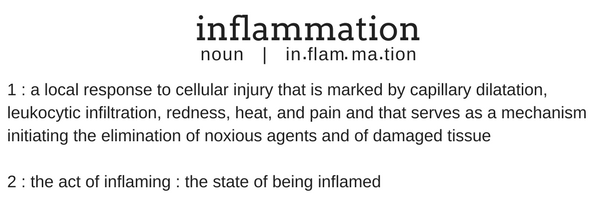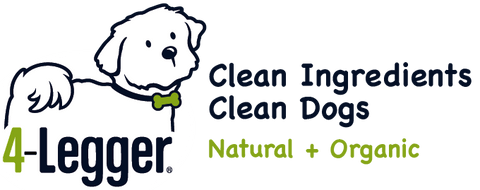What You Need To Know About Inflammation And Your Dog
Before my own cancer journey I didn't think a lot about how inflammation impacts our bodies or the bodies of our dogs.
I certainly hadn't made the connection between food, inflammation and chronic disease.
During and after chemotherapy my joints were very painful - a step beyond achy. This is thought to be a common side effect from receiving injections of Neulasta®, an injection given within 24 hours of receiving chemotherapy that stimulates the bone marrow to increase the production of white blood cells.
Without the injection, I likely wouldn't have survived chemotherapy as my cell counts were so low they were classified as "infection fatal" - meaning if I got an infection - it would kill me.
To help relieve the painful joints, my onclogist put me on Celebrex which helped take the edge off, but as soon as I missed a dose the deep bone pain was back.
Last year as part of my continual path towards supporting my whole body I started the Whole30 eating plan.
Whole30 isn't about losing weight although that does happen. It is about eating whole food for a minimum of 30 days to reset your body.
WARNING: It is strict: No sugar, artificial sweetener, beans, legumes, corn, dairy, grains, preservatives or soy!
You might ask, "what's left?!" Basically, fresh meat, fresh vegetables and fresh fruit. Whole food!
What happened in that first 30 days?
I was able to stop the prescription medications for joint pain!
I had more energy, was sleeping much better, waking up refreshed, my skin and nails improved, digestion dramatically improved and headaches greatly diminished. My mood was better, and I felt happier by eliminating all of those foods and ingredients for 30 days. In short, I was able for the first time, to understand how eating certain foods were affecting me and how I felt. That is powerful information to acquire!
Incidentally, there was the secondary benefit of weight loss too - a bonus!
I felt so much better after 30 days that I decided to keep going and make it a Whole60. The initial improvements continued and even more benefits became apparent.
Then came the holidays...
During the Thanksgiving and Christmas time period, we naturally chose to indulge in some traditions which involved a lot of sweets, big 'ol carbohydrate laced meals and all the other goodies associated with the season. I didn't completely abandon the Whole30 plan, but definitely had intermittent days where my eating did not reflect the wisdom I had gained over the previous couple of months. Boy did that indulgence come at a price!
My painful joints were back. I started having headaches again. Fortunately, I knew that the reason why was because of the Carbohydrates & Sugar I had eaten during the holiday festivities.
Guess what sugar and carbs are thought to contribute to in the body?

What does inflammation cause? Disease.
Yes. Really. Cancer, irritable bowel disease, encephalitis, seizures, neuromuscular disorders, joint and muscular pain and much more.
What does all this have to do with dogs? Many of the same things that cause inflammation in humans cause inflammation in dogs too. Ingredients really DO matter whether they are consumed or are in products that are applied to the body. So, let's consider how all this affects our dogs
Where Does Inflammation In Dogs Come From?
Inflammation can come from many sources - some examples include sensitivities to synthetic ingredients in traditional dog shampoo, low quality essential oils, artificial fragrance from candles, air fresheners, cigarette smoke, flea and tick treatments, flea and tick collars, grass, plastic bowls, laundry detergent, fabric softener, and you guessed it - food.
If your dog has had a vaccine reaction, their sensitivity is heightened and they are more likely to be a reactive dog.
What is a Reactive Dog?
If you've had a dog that was eating something for years and suddenly every time they eat it they get itchy skin or their skin gets patches indicative of a yeast infection, they are likely a reactive dog.
Having a reactive dog can be challenging. I know, I have one!
One of the triggers for reactive dogs is sugar.
A few days ago we had a customer contact us about her reactive dog - although at the time, she didn't realize she had a reactive dog!
She said that she loves 4-Legger Certified Organic Dog Shampoo and it has helped with her dog's itchy skin but her dog now has reddish spots on her belly and in her armpit area.
We asked what food she was feeding her dog and suggested she change foods to one that has less carbohydrates.
She came back and said that the carbohydrates aren't listed on the bag so how did we know how many carbohydrates were in her dog's food. Indeed! Think about that - carbohydrates are not listed in the nutritional analysis on your dog's food. Fortunately, we can show you how to figure that out so that you can make a better-informed decision about the food you feed your dog.
Calculating the Carbohydrate Content of Your Dog's Food
Your dog's food has nutritional information posted on the bag or on their website as required by law and in compliance with the Association of American Feed Control Officials (AAFCO) guidelines.
The guaranteed analysis lists the percentage of each of the nutrients in the food. The problem is that not all of the nutrients are listed! Carbohydrates are not required to be listed in the nutritional analysis.
AAPCO's website explains the nutritional analysis:
"The minimum percent of crude protein and crude fat, and the maximum percent of crude fiber and moisture are always required. Note that "crude" refers to the analysis method, rather than the quality of the nutrient. Guarantees for other nutrients may be required to support claims made in labeling (such as "High in calcium and vitamin A"), and you may include voluntary guarantees for other nutrients. The guarantees must be given in a particular order, in specified units and as a minimum or maximum, depending on the nutrient."
So, grab your dog's food and pull up the Guaranteed Analysis.
Below we've made some numbers up for an example.
Guaranteed Analysis
| Protein | 19% |
| Fat | 8.6% |
| Crude Ash | 2% |
| Crude Fiber | 4% |
| Moisture | 12% |
| Calcium | 1.2% |
| Phosphorus | 1% |
You would think that the total would add up to 100% which would be a COMPLETE nutritional analysis of the food. But since carbohydrates/sugar are not on the list, you will have to do your own calculation to find out how much is in your dog's food.
To calculate the carbohydrates add together all of the percentages listed and subtract that number from 100 to equal the % of carbohydrates in your dog's food.
So, in our example we add together 19% + 8.6% + 2% + 4% + 12% + 1.2% + 1% to = 47.8. Subtract this number from 100.
The total carbs in the example is 52.2%.
Note: If this is a dry dog food, you would add 6% into the analysis to account for the ash in the food. So, if this were a dry dog food, the total carb count would be 46.2%.
The carbs break down into starch. The starch breaks down into ... sugar.
Treats and snacks that are high in carbohydrates contribute to your dog's overall carb intake.
Grain free dog food substitutes the obvious grains like wheat and corn for legumes, potato, and sweet potato. They've not solved the problem!
Feeding your reactive dog food that is high in carbs and sugar creates inflammation, insulin resistance and yeasty skin. We've lost track of the number of pet parents who come to us with these symptoms - as soon as we hear redish brown spots on the belly or in the arm pits we know immediately the issue.
While none of us want our dog to be miserable and itchy, the bigger reason we need to address the itchy skin is the fact that chronic Inflammation results in sickness and disease.
If you have a reactive dog, elimination diets help to discover what you dog isn't sensitive to (at that very moment in time) and feeding a food that is lower in carbohydrates will decrease inflammation. For this very reason many dogs battling disease (cancer, neuromuscular inflammation, etc) go on Ketogenic or Raw diets and thrive.
Stay tuned... we're going to talk about yeast infections in dogs next!





